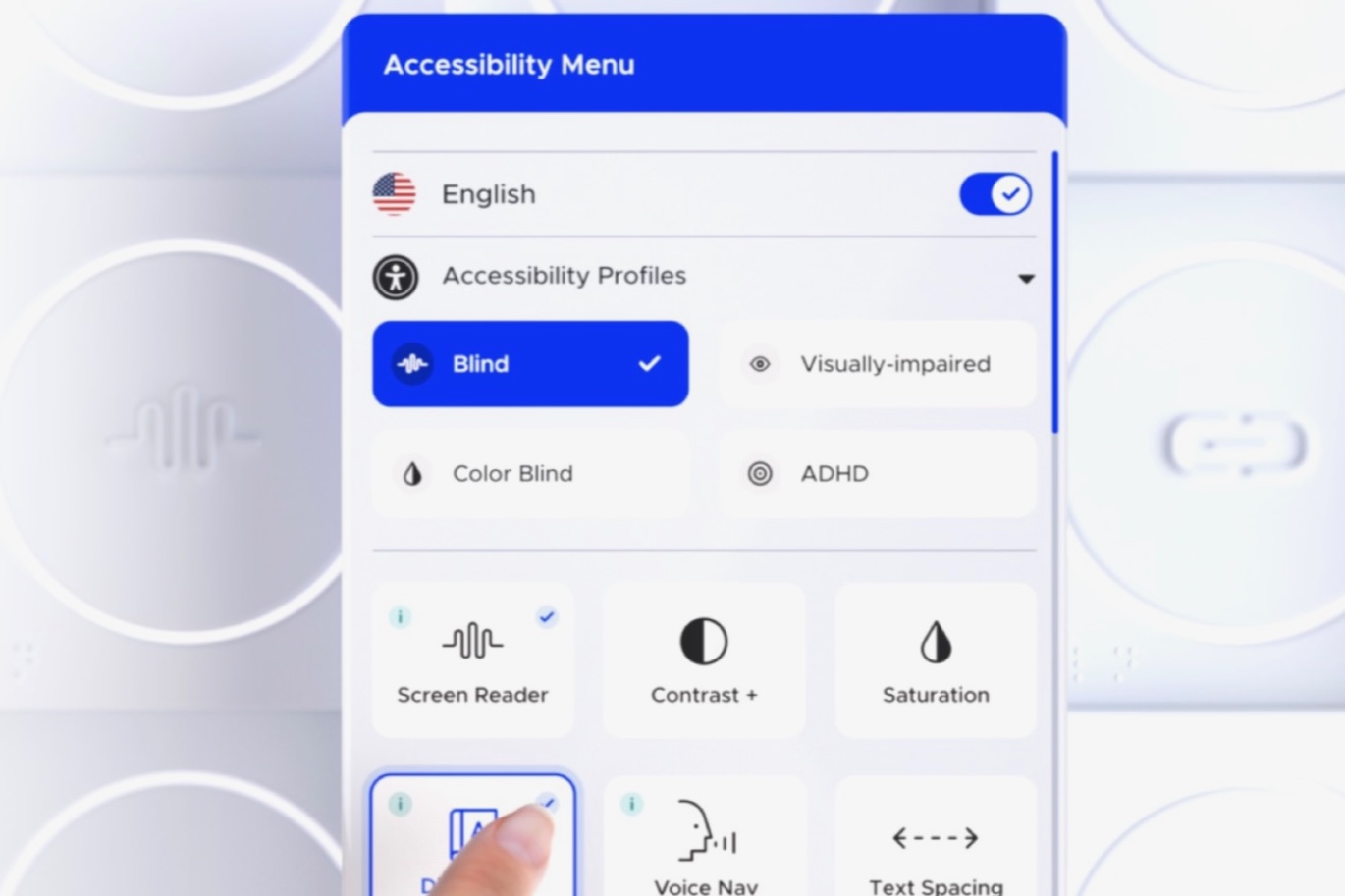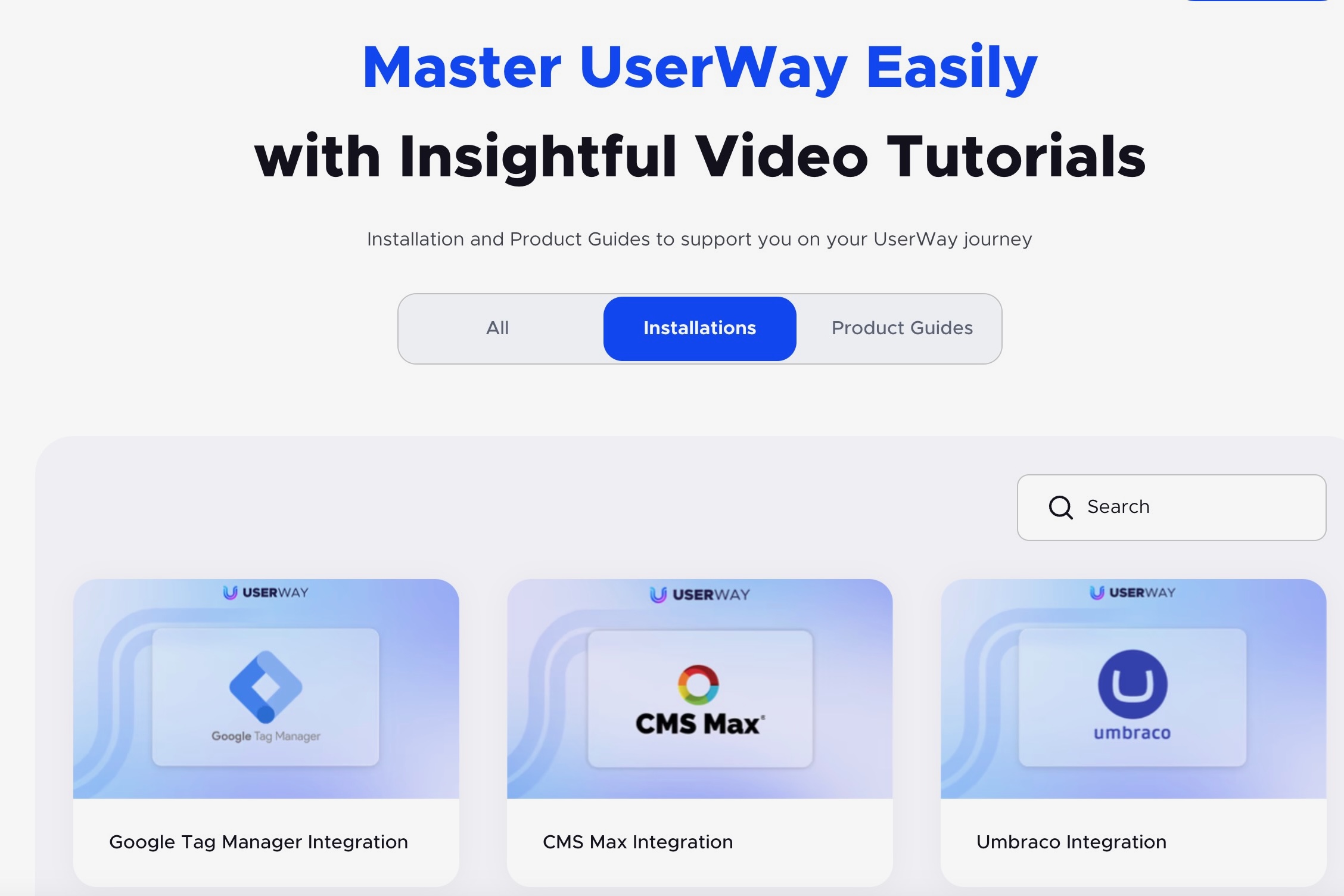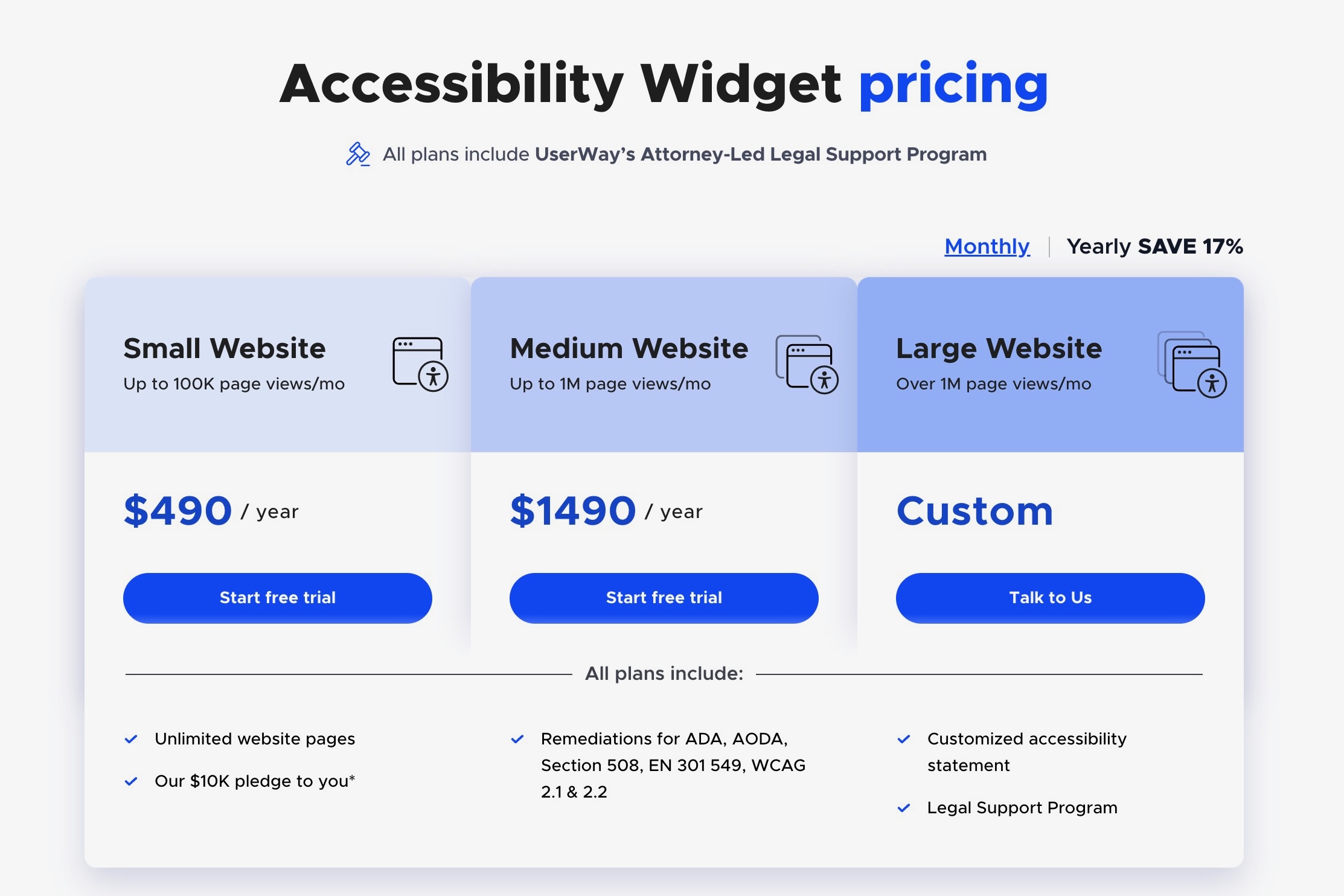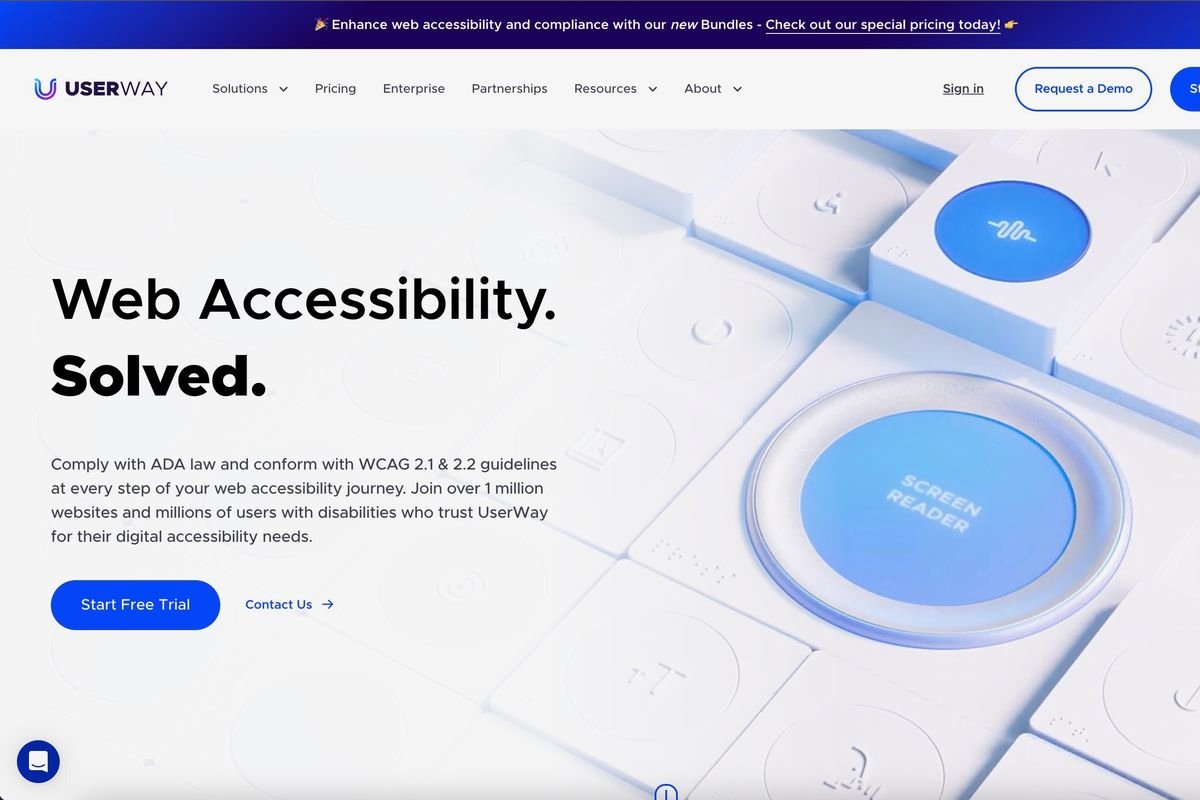As a website owner, you must ensure your website is accessible to all users, including those with disabilities. It is not only about promoting inclusivity but also a legal requirement. This is where UserWay comes in. It’s a web accessibility solution that helps to make your site compliant with several accessibility regulations, such as the ADA (Americans with Disabilities Act) and WCAG (Web Content Accessibility Guidelines).
UserWay is an artificial intelligence (AI)–powered solution that provides a widget that can be seamlessly integrated into your site, enhancing website accessibility without modifying its code. With a range of features tailored to assist users with disabilities, including vision impairments, cognitive disabilities, motor skills issues, and much more, UserWay ensures your website is accessible to everyone.
Website owners who want to make their website accessible to all should consider using UserWay. It helps you comply with legal requirements and provides a range of useful features to aid users with disabilities. However, weighing its pros and cons before deciding is essential, like any other solution.
Features
UserWay is a platform designed to assist website owners in making their websites accessible to all individuals, regardless of their abilities. To utilize UserWay, you must integrate a line of code that works seamlessly with popular content management systems like Shopify, WordPress, and Wix. Once implemented, the AI-powered widget immediately begins adjusting your website by enabling keyboard navigation, adjusting color contrasts, modifying text spacing, and more.
While the UserWays widget automatically handles all the accessibility requirements for your website, it also provides customization options. You can adjust the settings to ensure that the accessibility features align with your website design and functionality.

UserWay offers a lot more than just a web widget. In addition to the widget, the platform provides a comprehensive web accessibility scanner, monitor, check solution, and an audit tool. By simply entering a URL, the UserWay Accessibility Scanner can read your sitemap and automatically scan individual pages, which reduces the time and effort required. Moreover, the Accessibility Scanner can identify issues that may only appear on specific screen sizes and devices. It can scan 30,000 pages on mobile and desktop sites in less than an hour and deliver quick results in just a few minutes.
The UserWay Audit feature, on the other hand, is a manual tool where experts assess your digital assets manually for WCAG 2.1/2.2 AA compliance levels. By doing so, you will receive a full report that can help your team meet U.S., Canadian, European, and international regulations for websites, apps, and designs. With UserWay’s comprehensive suite of accessibility tools, you can ensure that your digital content is accessible to everyone, regardless of their abilities or disabilities.
How does UserWay use AI?

AI technology has been a topic of debate in recent times. However, it is widely acknowledged that AI plays a significant and primarily positive role in various industries. At UserWay, AI is utilized to improve real-time web accessibility in several ways.
One of the ways UserWay’s AI helps is by detecting and correcting accessibility violations in a website’s code. This automation saves time and resources compared to manual coding fixes. It also provides users with personalized browsing experiences, such as adjusting font size and color contrast.
Although UserWay’s AI reduces the need for manual work, it still requires human expertise to enhance the system. UserWay refers to this as a “Human-in-the-Loop” system, where people play a crucial role in training, monitoring, and refining the AI’s capabilities.
Installation, setup, and compatibility
UserWay’s comprehensive service revolves around its widget, which is the core of the company’s offering. The widget is designed with simplicity, ensuring easy integration for users. UserWay offers native integrations with various CMS platforms, including WordPress, Shopify, Duda, Squarespace, Magento, Joomla, Drupal, BigCommerce, and SharePoint. These platforms offer a seamless integration process, often featuring a dedicated button within the platform to connect with UserWay.
Moreover, UserWay’s solution can also work with other platforms, albeit not natively. These include Wix, Weebly, GoDaddy, Webflow, and GitHub Pages.
The UserWay Accessibility Widget is packed with over 50 innovative accessibility features that provide a high degree of control over the experience on your site, web app, or platform. The widget’s features include voice navigation, an integrated screen reader, accessibility profiles, site translations, usage statistics, and advanced customization capabilities. These features empower users to optimize their website’s accessibility and cater to a broader audience.

Adding the UseWay plugin is crucial for making your site more usable for every visitor, irrespective of their capabilities. However, the process may differ slightly depending on your CMS. But the good news is that the UseWay website contains easy-to-follow training tools to guide you through installation.
For this review, I worked with the UseWay widget with WordPress. And I must say, it was truly a breeze. The first step is downloading and installing the UseWay Accessibility plugin from WordPress. You can enable this feature by navigating to the Plugins area within your WordPress administration panel and looking for the plugin called “UserWay Accessibility Widget.”
Once you have installed and activated the plugin, choose it, then create a new installation. From there, you must register this installation with your UserWay account. Don’t worry; the registration process is straightforward to follow.
After that, you can enable the widget and customize its size, color, and position. You can also create an accessibility statement for the website, which is performed through the widget’s settings page. By making this statement, you are informing your users about your dedication to ensuring that your website is accessible to all individuals and describing your actions to accomplish this objective.
If you aren’t using WordPress, there’s nothing to worry about. UserWay has installation instructions via its website.
Plans and pricing

UserWay’s pricing is based on the monthly page views a website receives. The pricing plan offers two options: the first is for websites that receive under 100,000 page views per month, with an annual fee of $490. The second option is for websites receiving up to 1 million page views per month, which has a yearly cost of $1,490. Custom pricing is available if your website receives more than 1 million page views per month.
While the starting price of UserWay is under $41 per month, it’s important to note that the prices are per website. This means that the cost can add up quickly if you have multiple websites that require compliance. Additionally, prices increase significantly as you add extra features such as accessibility scanning and audits. However, UserWay offers bundles that can slightly reduce the prices.
Luckily, UserWay offers a 10-day free trial, allowing you to test the solution for your organization.
Final verdict
UserWay is a powerful tool that can enhance website accessibility and improve user experience for individuals with disabilities. By utilizing this solution, website owners can ensure that their websites meet the standards set forth by regulatory bodies like the ADA and WCAG 2.1. This can help make the website more accessible to a wider audience, including users with visual impairments, hearing impairments, and other disabilities.
In addition to meeting regulatory requirements, having an accessible website can also lead to increased user engagement and potentially reduce legal risks. By making your website accessible to everyone, you can reach a wider audience and potentially increase your customer base.
Given the benefits of inclusivity and the importance of meeting accessibility standards, opting for UserWay is a decision that many website owners find valuable. With its expertly crafted features and user-friendly interface, UserWay can help make your website more accessible and welcoming to all users, regardless of their abilities.







